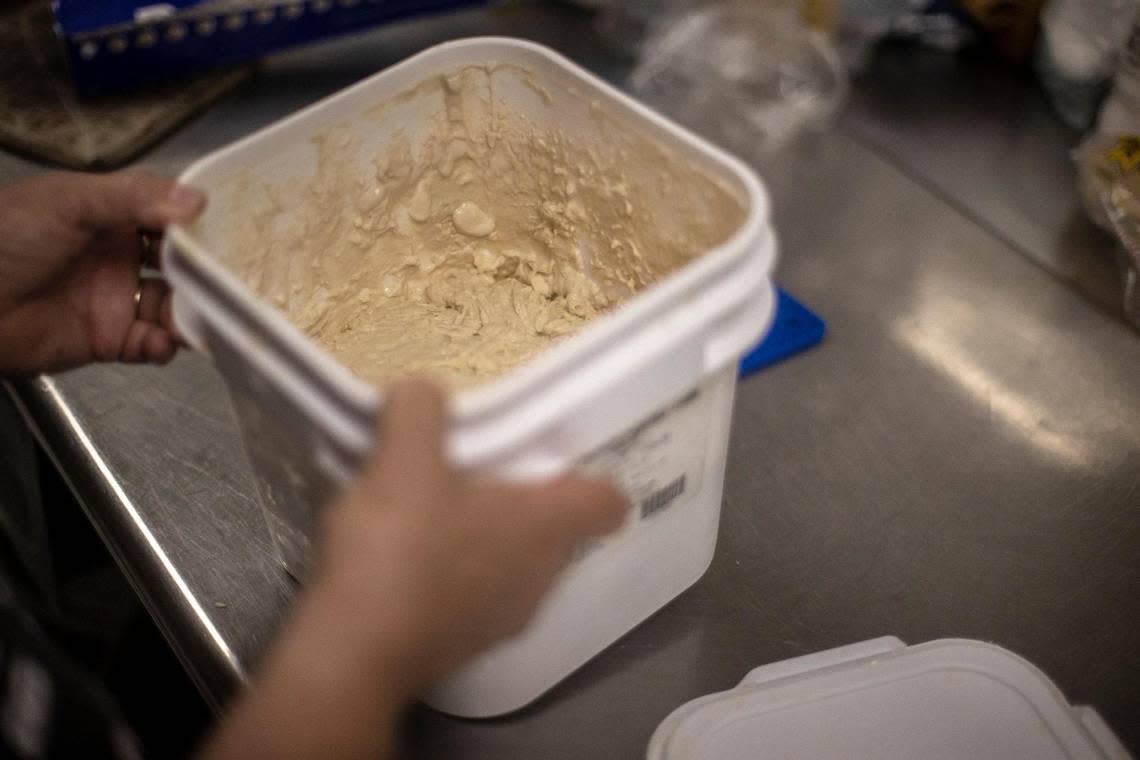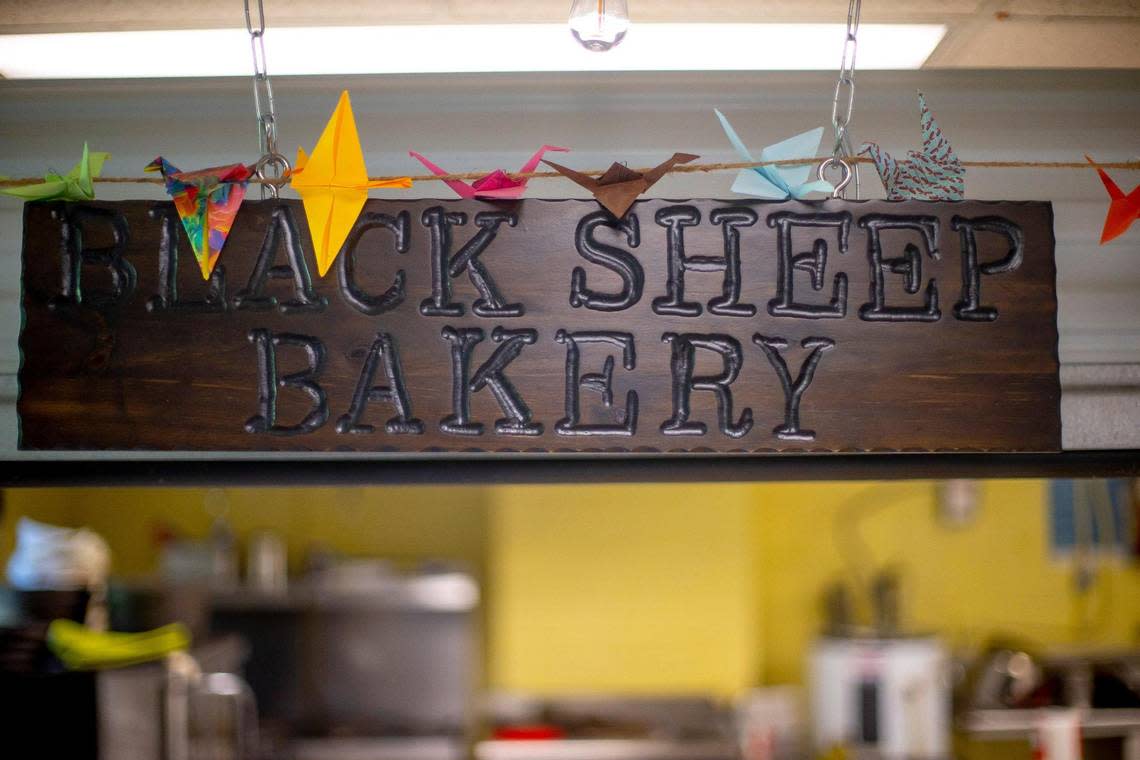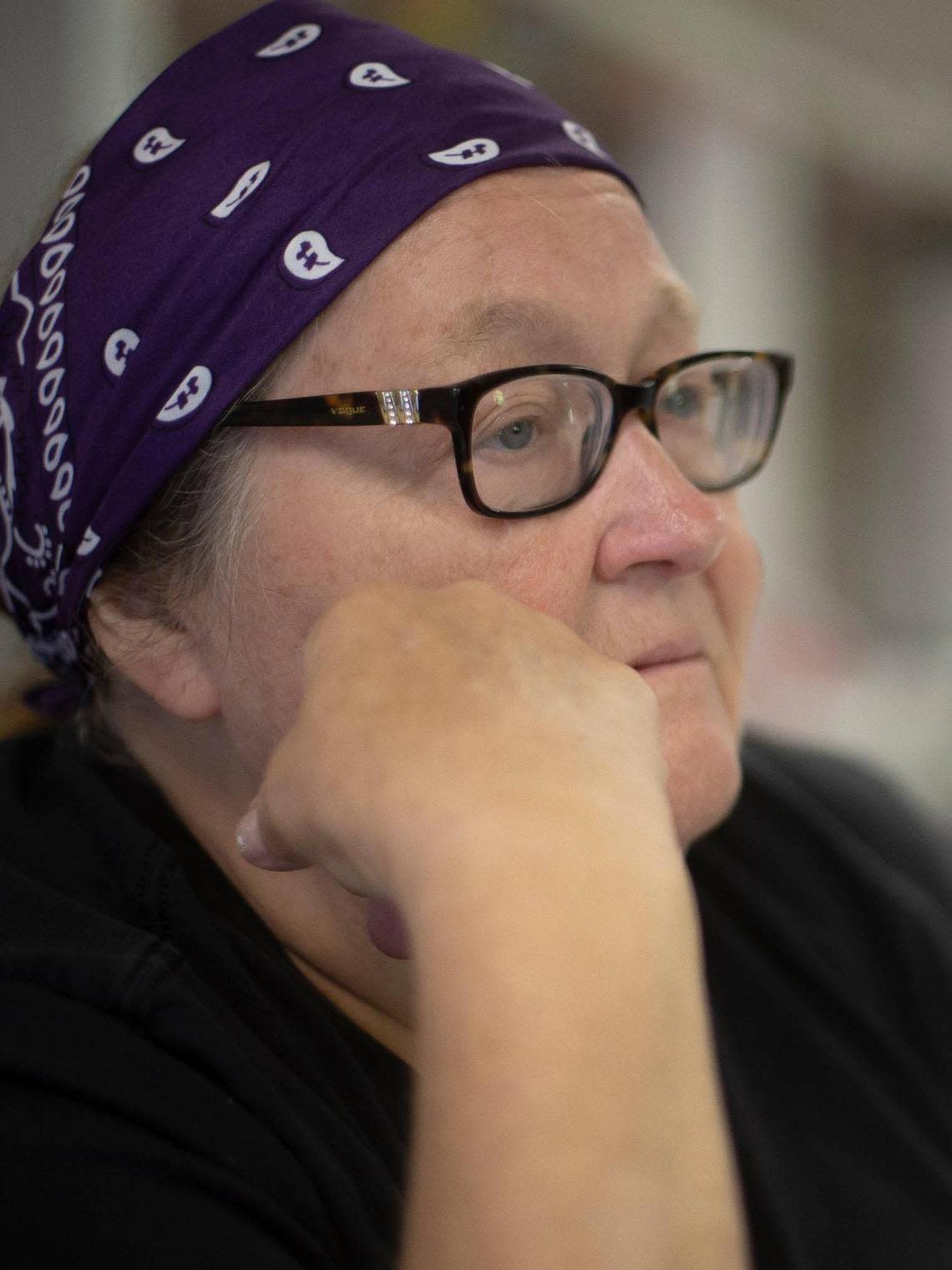In former coal camp, one woman takes on flood recovery in ‘small things with great love’
Gwen Johnson was born and raised in Hemphill, a former coal camp up the hollow from Fleming-Neon in Letcher County. When you live by the boom and bust of the coal that pays your family’s bills, you know uncertainty and misfortune — Johnson lost three uncles and a baby brother in the mines — and you feel the embrace of good times and of living among family and friends you’ve loved your whole life. But lately, Johnson feels like the waves of tragedy keep hitting without end: the devastation of coal markets amid a scourge of opioids, the pandemic and now catastrophic flooding that rolled through Hemphill, gaining strength before it crushed Fleming-Neon below.
Right now, sitting in an open shelter surrounded by boxes of detergent, rubber boots, canned beans and shampoo, she clings to a well-known saying by Mother Teresa: “Not all of us can do great things. But we can do small things with great love.”
Johnson, 64, excels at small things that add up to quite a lot. She chairs the board of the Hemphill Community Center, formerly its elementary school, and started the Black Sheep Brick Oven Bakery on the first floor as a way to make food locally and give employment to people in recovery. During the pandemic, she got a grant from the Letcher County Culture Hub to build an outdoor pavilion with WiFi because so many children were sent home from school with Chromebooks but no Internet. The pavilion is now a central staging center for relief supplies, and where neighbors charged their phones to tell their relatives they had survived the night of July 28. The electricity kept flowing, in part thanks to solar panels on the roof that Johnson secured with the help of the Mountain Association. She relies on the help of volunteers and doesn’t want to take credit, even if it’s deserved.
In the corner of the playground, Johnson’s daughter and son in law helped her build two bucket showers with a big kettle that heats up enough water to fill a five gallon bucket. She joined forces with the Churches of Christ Disaster Response Team, whose members are staying upstairs at the community center by night while they help fix people’s houses by day. They persuaded West Virginia Water to park a water truck in the center’s parking lot.
Unlike other sections of Eastern Kentucky, no one from Hemphill died. Not even any dogs or cats, she said, or the pot belly pig who lives a few houses down. (The electricity also mean the five-year-old sourdough starter for the bakery, to which Johnson is devoted, stayed cool in the fridge.) But every house along the hollow was affected, from a little water to total destruction.

“We’ve had no help from the government, we called everybody, so we just started doing,” she said. “We’re just a coal camp, and there’s an invisible line between here and Whitesburg, and so we have to make do and improvise.”
Making do is all they can do these days. Hemphill, which runs along a stream that’s considered one of the headwaters of the Kentucky River, is just one tiny corner of a natural disaster, one of thousands of stories of despair and resilience and maybe even recovery. But that’s a long way off for a community that is still suffering from disasters that came before this one. As a community activist, Johnson has thought long and hard about Eastern Kentucky and at this point, she doesn’t even know what to say.
“It’s a bafflement of what to do,” she said. “It’s a bafflement for Gov. Beshear, it’s a bafflement to all of us.”
Nowhere to go
Tony Potter lives close to the community center on land he owns with his brother and sister. His house caught the full brunt of the floodwaters and was totally destroyed. He’s taking turns staying with each of them and spends some his days helping Johnson at the center. He lost everything.
“I’ll be ok in a couple of months,” he said. He’ll probably build some kind of a shed on the property, just to have his own place again.
Potter lives on the homeplace, as it’s called, land that’s inherited from family, that he and his siblings pay taxes on. But many people who live on their homeplaces may not have a title or maybe that title was lost in the floods. So according to Johnson, that means FEMA will only reimburse them at rental rates, around $4,800- $6,000.
“They have nowhere else to go,” Johnson said. “How can they afford to relocate?”
Or what about sewers? Although Hemphill is close to Fleming Neon, the city sewer service stops down the road at Goose Creek. Most people exist with septic tanks, which were flooded, or maybe straight pipes that go into the creek. The powers that be never built the city sewer system up to them, even when coal severance taxes were coming in. Now there’s practically no money left. When coal markets were good, Kentucky was urged to put aside some coal severance dollars as a hedge against down markets, but they declined to do so. They kicked the can down the road.
“There was great need and you saw the competition for it, and the reality is that most of the county officials were not good stewards of that money,” said Dee Davis, executive director of the Center for Rural Strategies in Whitesburg. “It’s not like they stole it but it wasn’t invested strategically.”
The real deal
When government fails, as it frequently does in rural areas, is when people like Johnson — activists with an immense drive to help people all the time — step in.
“That just what my family does,” she said. But they’re also fighters. Her father was part of the UMWA before the strike at the Hemphill Elk Horn Coal Company, and he was arrested for allegedly burning down a coal ramp. (He confessed on his death bed to the crime.)
“This county has been a place of resistance and a place of deep pride that we have resisted,” she said. “I”m just so tired of my people not mattering.”
Johnson is the real deal, says Dee Davis. “She’s not like Pollyanna,” he said. “She’s been dealing with people who are fighting addiction, she’s created systems for people to get back in the workforce, she’s making a real difference.
“Her story is what makes living here worth it,” he added. “It’s not because everything is good and we’re all happy, eating peaches and cream — it’s because living here is worth the fight and I think she’s worth the fight.”

After 6 p.m., when the community center closes for the night, Johnson and other volunteers drive around even more remote hollows and roads to see what they can do to help people. Tuesday night, she said, her eyes welling with tears, she found a grandmother on oxygen sheltering under a carport with her special needs grandson; one man she knew was living in his truck.
Systemic problems like climate change and mine mitigation are a distraction for now. “Here’s the battle at the end of the day — if you can’t feed and clothe your babies, then what the f--- does that matter?”
The bafflement she will leave to the experts, a game without rules, as Davis calls it. “How do you imagine in six months what happens when the people Gwen is helping in tents face the cold?” he asked. “But it’s hard to make a six-month plan when people can’t get six days ahead.”
Johnson will keep helping because that’s what she does. That’s what her mother, who died in February, did. But she can’t stop thinking about a boy with special needs and his grandma living under the carport and what else she can do for them.
“What do you even do with all that?” she asked, her eyes welling with tears again. “It’s a lot. It’s just been a lot.”

